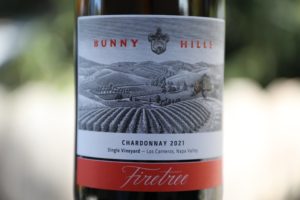

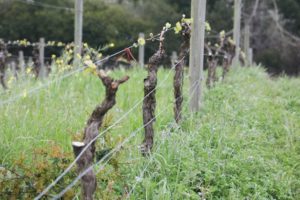 Firetree Family Vineyards This 70-acre property on the Napa side of Carneros was purchased by the Jimenz Family in April 2021 by husband and wife Ricardo and Dayva and their three children, Ricardo Alfonso, Sophya and Marianna. The land was originally part of Rancho Entre Napa a 7,000-acre Mexican land grant. It was used for cattle grazing in the late 1880s; records show that Riesling and Zinfandel were first planted here in 1883 by Italy born Giuseppe Antonio Sciligo on what was known as the Sciligo Ranch or the Sciligo Dairy on top of Sciligo Hill. Sciligo was a prominent rancher in Carneros; he and his family are buried in Tulocay Cemetery in Napa. A historic barn still stands on the property as do remnant stone walls from a prior structure, both presumably from when the Sciligo’s owned the property.
Firetree Family Vineyards This 70-acre property on the Napa side of Carneros was purchased by the Jimenz Family in April 2021 by husband and wife Ricardo and Dayva and their three children, Ricardo Alfonso, Sophya and Marianna. The land was originally part of Rancho Entre Napa a 7,000-acre Mexican land grant. It was used for cattle grazing in the late 1880s; records show that Riesling and Zinfandel were first planted here in 1883 by Italy born Giuseppe Antonio Sciligo on what was known as the Sciligo Ranch or the Sciligo Dairy on top of Sciligo Hill. Sciligo was a prominent rancher in Carneros; he and his family are buried in Tulocay Cemetery in Napa. A historic barn still stands on the property as do remnant stone walls from a prior structure, both presumably from when the Sciligo’s owned the property.
Before the Jimenez ownership, the land was owned by Diane and Ron Disney, the proprietors of Silverado Vineyard which is now owned by Foley Family Estates. Modern day grape growing on site began in 1983 with additional plantings in the late 1980s. A 100% varietal Firetree Vineyard designate Chardonnay was bottled by Silverado Vineyards for many years from a single block on the property (block D); the last vintage was from 2020.
Today 22 acres are planted entirely to Chardonnay including clones 4, 76, 95 and 96. Plans call for expanding the vineyard including planting small blocks of Pinot Noir and Syrah. The property features rolling hills with slopes up to 20% grade. The highest part of the property is just above 300 feet in elevation, and from here on a clear day one has excellent views overlooking the Carneros District and the glimmering waters of the San Pablo Bay in the distance. And it is here that two stately oak trees grow including the larger of the two which is the namesake for their property and wine brand. Firetree refers to this massive Canyon Live Oak (Quercus chrysolepis) with burn scars from previous fires and or perhaps lightning strikes. The inside of the main trunk is hollowed out.
The family had two requirements after they purchased the property; one was to stay with Walsh Vineyard Management who planted the early vines and has been overseeing the management of the vineyard ever since and to continue to sell grapes as part of prior contracts. Over the years grapes from the property have been sold to Cakebread Cellars, Lewis Cellars and HdV.
The transition in farming practices with the change in ownership have taken time to implement. The management of the vines has become more precise, focusing on individual needs of each block and sections within the blocks in regard to water usage, health of the vines and moving into all organic farming practices. And through a grant from the Napa County Resource Conservation District, they have been working on implementing permanent native cover crop specific plants. And through a grant from the California Healthy Soils Program they have been increasing composting and conservation agriculture practices.
The property is home to a diverse spread of wildlife including cranes, foxes, coyotes, turkeys and deer. And with all the rain during the winters of 2022 and 2023 they noticed an increase in wildlife on the property. Fortunately there are no wild pigs living here (they are known for damaging vineyards). In addition to the wildlife, teddy bear (babydoll) sheep are raised on the property and are used to graze around and among the vines depending on the time of year and height of the cover crops.
Water for irrigation is collected in a rain fed pond. The majority of the vines have been spur pruned but more recently parts of several blocks were converted to cane pruned, a more efficient way to manage vines during drought years (removing shoots as needed). During the height of the drought years, the water level in their reservoir was extremely low; as a result, they cut back the amount of water on the vines. The vine health was still very good, but yields were as low as only one ton per acre.
—
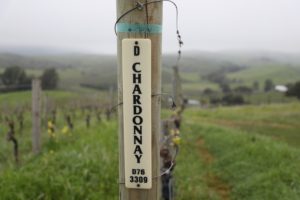

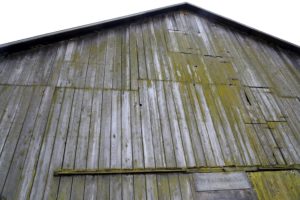 Ricardo was born and raised in Venezuela and has been involved in a diversity of businesses relating to agriculture, served as an army officer, was a system engineer and has invested in restaurants and the music business. Davya is an attorney and has also been a judge.
Ricardo was born and raised in Venezuela and has been involved in a diversity of businesses relating to agriculture, served as an army officer, was a system engineer and has invested in restaurants and the music business. Davya is an attorney and has also been a judge.
In the mid 2000s, they opened a small restaurant called Malina in Valencia, Valenzuela. They later opened additional restaurants in the country. Riccardo remembers the wonderful relationships he developed through their restaurants with both the kitchen staff, customers and also the wines. Malina was an homage to his grandmother who imparted her love of cooking to him.
He and Davya made several memorable trips to further their education about wine but also to purchase wines for their restaurants. One of their early trips was to Mendoza in Argentina. Later they connected with a tour operator offering winery experiences in Burgundy and other parts of France. Ricardo remembers what he called a life changing 12-day wine trip; he was in Monaco for Formula One and joined Dava in Lyon where they proceeded to visit multiple wine regions in France with several other couples. They visited numerous ‘wow’ wineries and restaurants, tasted through wines from premium producers and were inspired to one day possibly have their own vineyards and winery.
Soon after they took another wine focused trip to Bordeaux and later to Italy. Their trips to these wine regions increased their appreciation for wine and furthered their own education. They also were inspired in particular by wineries owned by the same family for generations and their dedication to their land and carrying on a family tradition for future generations. Ricardo told us an important part of their philosophy is to take a long vision with the property; he and Davya want to pass on their own values and dreams to their children, grandchildren and future generations. But not rush into anything, be patient and take a thoughtful approach to building their brand.
And these trips inspired them to get involved in other restaurants including the 200-seat rooftop Juvia Restaurant opened in 2012 in Miami. It is now closed but operated for 11 years; during its time in business, it won a James Beard award for its design.
The family moved to Miami in 2014; Ricardo and Davya visited Napa Valley for first time in 2015. By the end of 2020 the family was ready to travel somewhere and Napa was mentioned as a possible destination for a family trip. Sophya was not familiar with Napa Valley and was curious about the region. Her parents described its beauty; Sophya told them it was a place she must visit. The entire family flew out about a month later with the intent to purchase property. They looked for vineyard property in the mountains; they wanted an existing vineyard and were not initially interested in purchasing a vacation home. They quickly learned that one of the requirements of any property is it must have cell service. One of the sites they visited was beautiful and had a well established and well-regarded vineyard but had no cell phone reception.
Sophya is interested in the outdoors; as she says, “nature makes me happy”. During her early visits to the property she would talk to the vines, call them her “ladies”. Her father suggested she study botany; at the time she didn’t know she could study something related to her love of the outdoors and plants. She wants to have a job where she gets up and says, “I want to go to work today”, rather then, “I have to go to work today”. Her enthusiasm and passion for the outdoors is contagious. Perhaps she will oversee the vineyard management of their property someday.
Select Wines
The inaugural vintage of Firetree was in 2021. Winemaker Julien Fayard and his team craft the wines.
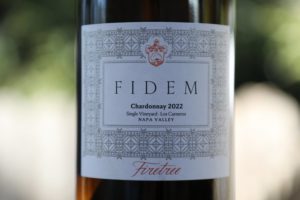

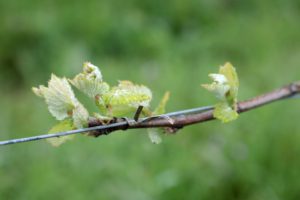 The 2021 Firetree Bunny Hills Single Vineyard Los Carneros Chardonnay is medium gold; the bouquet sports aromas of honeysuckle, honeycomb and pineapple along with stone fruits including apricot, nectarines and yellow peaches. The aromatics are sweetly fruited. The flavors somewhat mirror the bouquet with a minerally character we noticed right away on the palate along with apricot, nectarine and chamomile. A flavor of mandarin orange is most noticeable on the fruit filled finish. Standouts of this wine are its bright fruit, supple texture and overall balance. It drinks well by itself and is not an oaky nor buttery bottling. 13.5% alcohol. The wine was fermented in thermo-regulated small stainless steel tanks and once used French oak followed by full malolactic fermentation. The wine was aged on the lees for 6 months before the final blend was assembled and then bottled.
The 2021 Firetree Bunny Hills Single Vineyard Los Carneros Chardonnay is medium gold; the bouquet sports aromas of honeysuckle, honeycomb and pineapple along with stone fruits including apricot, nectarines and yellow peaches. The aromatics are sweetly fruited. The flavors somewhat mirror the bouquet with a minerally character we noticed right away on the palate along with apricot, nectarine and chamomile. A flavor of mandarin orange is most noticeable on the fruit filled finish. Standouts of this wine are its bright fruit, supple texture and overall balance. It drinks well by itself and is not an oaky nor buttery bottling. 13.5% alcohol. The wine was fermented in thermo-regulated small stainless steel tanks and once used French oak followed by full malolactic fermentation. The wine was aged on the lees for 6 months before the final blend was assembled and then bottled.
The 2022 Firetree Bunnny Hills Chardonnay is medium gold; one can smell the difference in vintages right away as compared to the 2021 bottling. The bouquet offers more citrus notes including a lemon zest, lemon verbena, lemongrass and green apple. The aromatics are a little more shy than the 2021 vintage and need time to fully open as the wine evolves in the glass. The bouquet offer scents of white peach, citrus blossom, and opens to pineapple and pineapple guava with a subtle nutty character including of hazelnut. The mouth feel offers a supple and very rounded texture, with an almost saline character. The acidity is bright but not bracing. This is a superbly balanced bottling. This wine sports flavors of green apple, white peach, white nectarine and not fully ripe pineapple. A “summertime sipper” as Ricardo calls it. This vintage like the 2021, was sourced from a single block on the property (Block D).
Starting in 2023, the Bunny Hills bottlings are crafted from multiple blocks with the grapes from each part of their vineyard fermented and aged separately before the final blend is created. And the name ‘Bunny Hills’ refers to both their enjoyment of skiing, the fact that they are new to the wine business (bunny slopes) and an homage to rabbits that live on their property.
Fidem et Futurum in Latin means faith and future; both words refer to two very important components of Firetree Vineyards. Their faith is an integral part of their own lives and they are building something special for future generations. Their flagship Chardonnay bottling is FIDEM.
The 2021 Firetree Chardonnay FIDEM is dark gold in color; the open-knitted and diverse bouquet is highly aromatic with scents of pineapple, papaya, mango, Crane melon, apricot joined by vanilla, butterscotch, honeycomb, corn tassel and a light toasted oak character. And it also reminds us of slicing open Golden Delicious apples at the peak of their ripeness. If one wanted to call its scents dessert like, we would not argue with that person. The palate is richly endowed from start to finish with flavors of pineapple, Comice pear, baked apples, vanilla pudding, tapioca and mandarin orange. It finishes rich and brightly lit from the accompanying acidity. It’s texture is creamy, supple and slides across the palate as smoothly as Michelle Kwan glides over ice. This is not a Chardonnay that necessarily needs food, as it is highly enjoyable by itself.
The 2022 Firetree Chardonnay FIDEM is medium gold in color; for reference we tasted this wine exactly one month after bottling. The bouquet offers aromas of ripe pineapple, stone fruits including apricot, star jasmine, citrus blossom, butterscotch, with some tropical notes here as well, including mango. If we were to describe two words for the bouquet it would be ripe elegance. This wine offers a supple, rounded and creamy texture. And it takes the level of intensity and richness up a notch from the Bunny Hill bottlings. The palate sports flavors of pineapple, Golden Delicious apple, apricot, butterscotch, crème Brule and a honeyed note including honeycomb. The finish is rich and persistent. This is a very texturally driven Chardonnay. We like that. Delicious is often an over used word to describe one’s thoughts about something highly palatable; in this case it simply summarizes the overall character of this wine. The grapes were sourced from two blocks including primarily block E but also from block F. This wine was aged for 18 months in French oak barrels and was was partially fermented in concrete eggs.
Maison Fayard, Napa
Select bottlings of Firetree Wines are available for tasting and or purchase at Maison Fayard in downtown Napa. This space opened on September 23, 2023. The previous tenant was Engel & Volkers; after they vacated the premises the space was remarkably renovated and completed in about 3 weeks – perhaps some sort of record for shortest amount of time needed to convert an existing space into a tasting room in downtown Napa. The interior remodel was overseen by Cruz Calderon (co-proprietor of Scalon Cellars). Artwork will rotate from time to time; the inaugural artist represented was Laurie Shelton, proprietor of CAMi Vineyards who is known for her paintings of colorful cows.
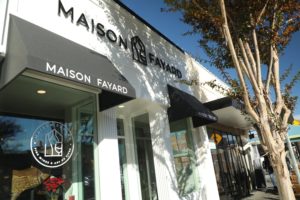 Maison Fayard is a collection of wines produced by Julien Fayard including wines under his own ownership (Julien Fayard, Purlieu, Just Pink!, Les Vins Julien and Covert Estate). Most of the brands he makes wine for are from Napa Valley but there are several producers whose focus is non Napa Valley wines. This collection is diverse including varieties and price points. The interior is partly a bottle shop, collection of wine accessories and educational tools for sale and a tasting space with a private room located upstairs for more private tastings. Maison Fayard is located at 1408 2nd Street in downtown Napa. As of our latest update, they are open daily from 10 to 6 PM.
Maison Fayard is a collection of wines produced by Julien Fayard including wines under his own ownership (Julien Fayard, Purlieu, Just Pink!, Les Vins Julien and Covert Estate). Most of the brands he makes wine for are from Napa Valley but there are several producers whose focus is non Napa Valley wines. This collection is diverse including varieties and price points. The interior is partly a bottle shop, collection of wine accessories and educational tools for sale and a tasting space with a private room located upstairs for more private tastings. Maison Fayard is located at 1408 2nd Street in downtown Napa. As of our latest update, they are open daily from 10 to 6 PM.
This part of 2nd Street (between Franklin & School streets, sometimes locally referred to as SoFi – south of First Street) has seen as much of a renaissance as any other part of downtown. One of Fayard’s nearby wine neighbors, Gamling & McDuck were one of the very first businesses part of this burst of energy brought to this part of the city. It’s a hip and happening place to hang out, especially on the weekends and features a variety of welcoming shops including tasting rooms. And in the spirit of neighbors having fun, Jeffries General next door, Benevolent Neglect across the street and Gamling & McDuck carry nerf guns next to their counters for friendly neighborhood fights. Although on the second day they were open, we personally provided Maison Fayard with a nerf gun of their own to defend themselves as needed.
Maison Fayard also hosts once a month Fayard & Friends Flight Night in which select wines produced by Fayard’s winemaking team plus wines from another non Fayard wine brand are showcased in the tasting salon. And private lunches combined with tastings can be reserved ahead of time.
Total annual production of the Bunny Hill bottling is 300-400 cases and of FIDEM, 80-180 cases. For more information, to join their mailing list or to purchase wines, visit: www.firetreevineyards.com

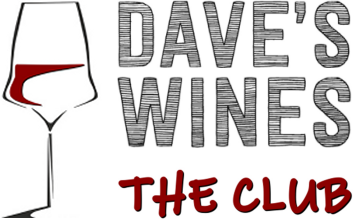




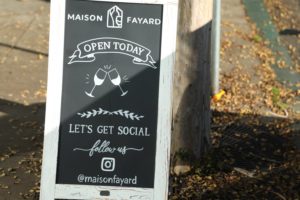
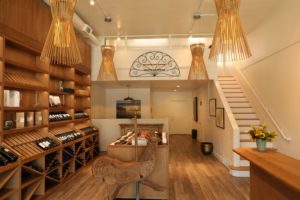
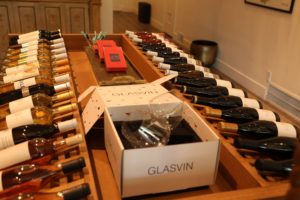
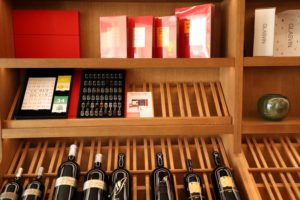
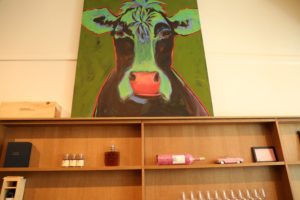
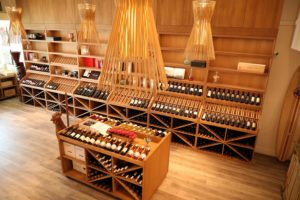
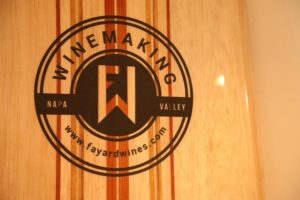
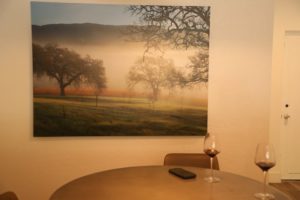
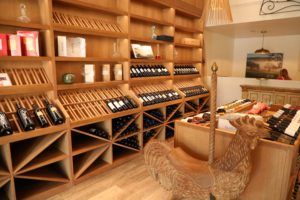
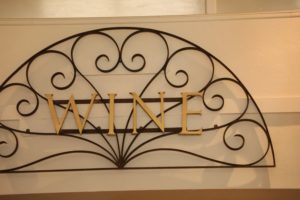
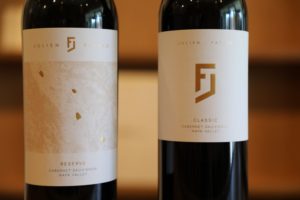
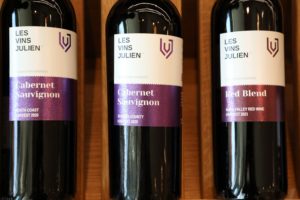
Leave a Reply